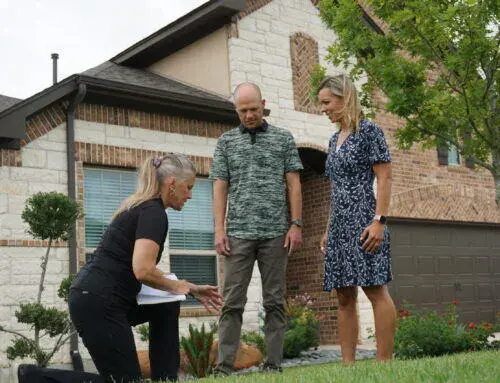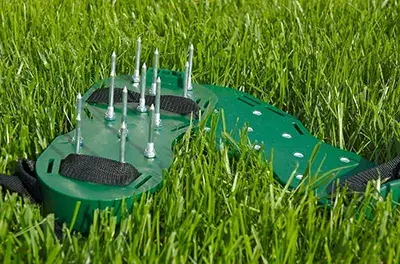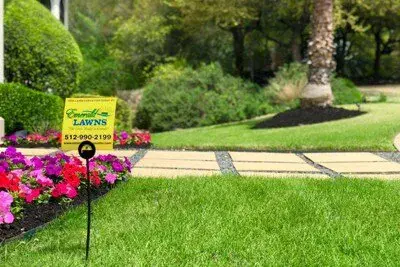Lawn Care | Dallas-Fort Worth Area
Lawn Care Aeration and Organic Topdressing in Dallas-Fort Worth
![]()
Bundle & Save
All throughout the DFW area, we create an environment where roots want to grow!
Get a Quote in 2.5 Minutes
Custom Solutions For Your Lawn
Three Ways to Elevate Your Lawn’s Health and Beauty
Lawns in the Dallas and Fort Worth area are located on dense, caliche-infused, dark clay soil, overlaying a shallow sandy loam, lacking in both nutrients and robust root systems for easily maintained lawns.
This is why we have a specialized team solely focused on incorporating compost.
Liquid Lawn Aeration
Unlock the compacted soil to allow for the circulation of air and water through cutting-edge liquid aeration techniques.
Topdressing Lawn
Our compost enriches the soil with biological organisms and organic material, fostering a nutrient-rich environment.
Leveling
Address low areas in your lawn while simultaneously reinforcing it against damage, achieving the perfect aesthetic.
Liquid Aeration
Why should we aerate our lawn and what should our lawn experience after we do?
It’s imperative that your roots extend deeper and wider than the height of your grass,
this is a crucial factor for maintaining a healthy turf.
Why Should You Aerate Your Lawn?
Compacted soil hampers root expansion. Liquid aeration, as opposed to core aeration, delves deeper and wider, establishing numerous pathways for nutrients, water, and roots to thrive.
When Should You Aerate Your Lawn?
Aeration of the lawn stands as a pivotal step in creating a healthy and vibrant lawn. Ideally, you will want to aerate twice a year in the spring and fall to help your lawn deal with the stress of the hot Texas summer.
Visible Results
Developing a robust root system is key to achieving lush, vibrant turf. You’ll notice visible improvements in as little as 7-10 days! Say goodbye to hard soil and impermeable clay – they’ve finally met their match.
Organic Topsoil Jump-Starts Turf Health
The soil in the Dallas/Fort Worth area is notoriously poor and has high pH (i.e. anemic). This makes it important to add topsoil to help your lawn grown in a healthy environment.
But…our “dirt-geeks” will fix that with organic, locally-sourced topdressing.
Why Topdressing?
The heat and drought in the Dallas/Fort Worth area cause soil compaction which directly impacts your soil’s ability to retain nutrients. This concentrated combination of organic matter & nutrients trigger the microbial activity your lawn needs.
What is it?
We locally source & audit our lawn topdressing. Watch the video above to learn from our Team of experts as they describe the composition of rice hulls, cotton burr, pine shavings and saw dust.
When to Apply?
We apply our top dressing January through May and September through December. Spring topdressing provides the organic matter the your turf needs, while a fall application helps recover from summer stress.
We’ll Earn Your Trust Every Visit
Lawn Leveling in the Dallas/Fort Worth Area
Utilizing USGA-grade top-dress sand effectively evens out uneven surfaces and fills in any gaps in your grass, preventing nutrient runoff.
Professional Grade Application
Emerald Lawns utilizes a leveling rake along with custom-built equipment featuring a large, commercial-grade brush to distribute sand evenly into low-lying areas and remove excess from elevated surfaces.
Highest Quality of Sand
The endorsement by the USGA speaks volumes about its quality. Not only does this method enhance drainage, but it also expedites thatch decomposition and aids in neutralizing the acidity of the soil in the Dallas and Forth Worth area.
Results Guaranteed
Safeguard your lawn against oversaturation, fungal infections, and disease. We stand behind our work with a 100% Satisfaction Guarantee; if anything seems amiss, we’ll promptly return to rectify it.
BrianDallas
"Great job."
Austin does a great job. Emerald lawn care knows texas grass! And is able to combat the weeds.
DavidDallas
"Happy with the results."
I had my reservations on whether or not Emerald Lawns could tame our overgrown weeds in our rock garden, but they assured us they could help. I’m happy to say they have done what I thought would never happen… tame the awful weeds we could never get under control!
RachelDallas
"Lush, green, beautiful lawn."
I have been using Austin at Emerald Lawns this year. He has turned a lawn full of weeds and dandelions into a lush, green beautiful lawn. He is always professional, explains what he does thoroughly and takes great care of my lawn.
FAQS
Question: What does topdressing cost at Emerald Lawns?
Answer: This will require a sales representative to measure your lawn and/or the specific area you desire to apply the topdressing!
Question: How does lawn leveling differ from grading?
Answer: Grading would strip the lawn prior to application causing weeks to months of recovery time; we do not perform this service.
Question: When should I see results from my last topdressing treatment?
Answer: If you combined liquid aeration and topdressing, you will notice results faster and that last longer. When the temperatures warm up you will notice your lawn to be more vibrant. The key to remember – with topdressing, you are improving your soil’s composition which improves with an annual application.
Question: When is the best time to apply topdressing to my lawn?
Answer: There are 2 primary windows for optimum results! The 1st is January – May and the 2nd is late September – December.
Question: Do I need to aerate my lawn if I get topdressing?
Answer: We strongly encourage liquid aeration and topdressing! Liquid aeration opens up pores, creating pathways that run deep and broad for the nutrients to flow down to. Your roots will “chase” those nutrients thereby making your root system deep and dense. This in turn produces thick healthy turf!
Question: What is Emerald Lawns topdressing composed of?
Answer: As with all other applications Emerald Lawns chooses for improving soil health, we carefully select our topsoil based on the needs for Central Texas soil (which is compact, clay with high pH).
Cotton Burr – because it contains both macronutrients and micronutrients is a valuable ingredient for soil and turf-root restoration thereby aiding plant growth in the spring.
The burr is comprised of the cotton plant’s organic leftovers such as its seeds, stalks, and leaves which are a nutrient-dense and rich source of nitrogen for the compost. In addition to its nutrients, cotton burr contains high levels of useful microbes and bacteria which are outstanding for loosening clay soil. These properties make it a first-rate ingredient for amending the soil.
Pine Shavings – help the soil retain moisture, and will contribute to the flow of oxygen, water, and nutrients into the soil through the pores it creates. The pine is an excellent source of potassium, phosphorous, iron, magnesium, and additional minerals to restore the soil composition.
Pine Sawdust – is used to add carbon to the mix and to balance the nitrogen. In the fall your soil doesn’t require a “double-shot” of nitrogen for turf growth.
Rice Hulls– have three valuable attributes for amending the soil. They assist in water retention, aeration, and add organic matter to the soil, which are important in the fall and winter months.
Question: When should I see results from my lawn aeration treatment?
Answer: If you are watering and mowing correctly, as a rule of thumb, during the growing season you should see results in 2 weeks. For weed treatments (and depending on the specific weed type) you should see “curling & wilting” in about a week. It may take up to 3 weeks for weeds to die, longer in the winter, early spring, and late fall.
Question: For leveling, how big of a hole can we fill with one application?
Answer: Our topdressing machine will apply a smooth, even layer of sand, about ½” thick. For larger divots, we will shovel sand to fill in problem spots and deploy our leveling rake & commercial brush to smooth it over. We need to make sure about ¼” of grass protrudes through the sand so as not to cause damage to the existing turf.
Question: Will one leveling application smooth all the holes and bumps from the lawn?
Answer: Unfortunately, this is usually not the case. We will do our very best to smooth these out, however, after the application has settled, there can be additional pockets that will need to be filled. When we water (or it rains), the sand often filters down into tiny air pockets in the soil, creating a need for additional applications.
Question: When is the best time to apply the leveling sand to my lawn?
Answer: Any time the grass is actively growing is an excellent time to apply the leveling application, typically mid-May through mid-October.
Question: How often should I water my lawn after a leveling application?
Answer: We recommend it at least twice a week. The more frequently you water, the quicker it will allow the grass to grow through.
Question: How soon can I apply a second leveling application if needed?
Answer: As long as we are still in the growing season and the previous application of sand has settled in, we can apply other applications as needed.
Question: Where can I get a rebate for Topdressing?
Answer: Here is a list of a few municipalities that participate. If your city is not listed, please check your local utility website.
- Austin residents can receive “$50 for at least 2 cubic yards (54 cubic feet) of compost” through the “Landscape Survival Tools Rebate”.
- Round Rock residents can save $100 for 1/4″ to 1/2″ of compost.
- San Marcos residents can access, “50% of the cost of compost service or material purchase price, up to $200”
Question: Will the leveling sand get too hot in summer and burn my grass?
Answer: No, although the surface of sand will retain heat, it will stay relatively cool below the surface, leaving no adverse effects on the lawn.
Question: Should I mow my lawn before a leveling application?
Answer: Yes, mow at half the lawn mower height prior to application to allow a faster recovery.
Question:How do I know if I need topdressing?
Answer: If your lawn is thin, dull in color, and/or subject to heat stress. Due to our thin and poor soil, topdressing is the single most effective solution you can do for your soil and lawn regardless of its age! We strongly recommend 1 application each year.
Question: How will an application of leveling sand affect mowing the lawn?
Answer: Mowing the lawn in the area where sand has been applied will not be necessary until the sand “settles” into the soil; typically, after two weeks.



